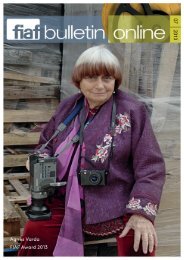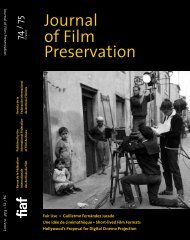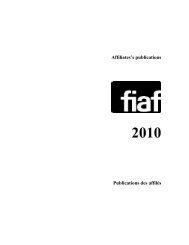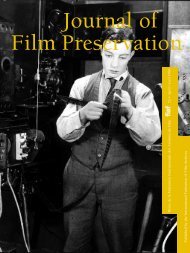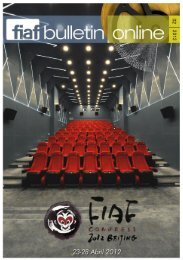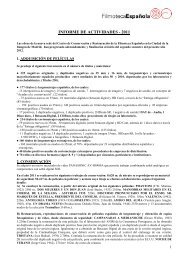Journal of Film Preservation N° 56 - FIAF
Journal of Film Preservation N° 56 - FIAF
Journal of Film Preservation N° 56 - FIAF
You also want an ePaper? Increase the reach of your titles
YUMPU automatically turns print PDFs into web optimized ePapers that Google loves.
tradition <strong>of</strong> Blood <strong>of</strong> a Poet and Fall <strong>of</strong> the House <strong>of</strong> Usher. In toto, these<br />
amateur films could be programmed as part <strong>of</strong> an alternative avant-garde<br />
film history, which would include all those films not canonized by the<br />
<strong>of</strong>ficial film histories. That an avant-garde film history is still very much a<br />
matter <strong>of</strong> huge gaps and fissures in our knowledge is demonstrated by<br />
the fact that nearly fifty filmmakers made such films in the United States<br />
before Maya Deren, yet all <strong>of</strong> them have heret<strong>of</strong>ore been excluded from<br />
the canon. On the other hand, we need to realize that most “classical”<br />
avant-garde films from Man Ray to Maya Deren were in fact amateur<br />
films, made by artists who were not full-time<br />
filmmakers. Not until after World War II were<br />
avant-garde filmmakers pr<strong>of</strong>essionalized, thanks<br />
to museums, universities, and government and<br />
foundation grants.<br />
As a number <strong>of</strong> speakers noted, archivists must<br />
also realize that amateur cinema documents a<br />
social phenomena <strong>of</strong> immense, international proportions,<br />
and therefore represents a history <strong>of</strong> the<br />
medium itself. Amateur film clubs existed world<br />
wide and developed global systems <strong>of</strong> distribution<br />
and exhibition. Thus, since the 1920s literally<br />
hundreds <strong>of</strong> thousands <strong>of</strong> amateurs have<br />
taken the means <strong>of</strong> production <strong>of</strong> mass communication into their own<br />
hands, in order to produce something akin to a democratic art form. This<br />
point was made most directly by Pr<strong>of</strong>. Patricia Zimmermann from Ithaca<br />
College. Her very dense lecture summed up many important issues,<br />
including: 1) Transnational, multimedia corporations now control the<br />
production and distribution <strong>of</strong> images world-wide, delimiting the expression<br />
<strong>of</strong> public and local cultural formations, in the interest <strong>of</strong> creating<br />
passive consumers. 2) The study <strong>of</strong> amateur film and amateur film cultures<br />
allows for the construction <strong>of</strong> a more diversified, even conflictladen<br />
view <strong>of</strong> history which refuses to harmonize ideological<br />
contradictions. 3) Amateur films document the history <strong>of</strong> marginalized<br />
peoples and cultures, but maybe more importantly, their fantasy lives, i.e.<br />
they are documents <strong>of</strong> social relations at the fringes. 4) As a result <strong>of</strong> its<br />
very independence from both the technology and economy <strong>of</strong> mass<br />
media, amateur film still allows for a freedom <strong>of</strong> expression that can open<br />
-up suppressed and politically undesirable discourses, or as Zimmermann<br />
put it, « create an imaginary geography beyond the global flows <strong>of</strong><br />
transnationalism.» Therein lies the promise and pleasure <strong>of</strong> amateur film<br />
Clearly, much work needs to be done. Amateur film now encompasses<br />
amateur video, an area the major archives have not even dared to touch,<br />
given video’s preservation problems. Secondly, criteria for collecting and<br />
evaluating amateur film need to be formulated, if the archives are to<br />
begin systematic preservation. Finally, as this conference proves yet again,<br />
film archivists need to communicate more with film historians, not only<br />
(grudgingly) providing services (as in the past), but entering into a true<br />
dialogue.<br />
53 <strong>Journal</strong> <strong>of</strong> <strong>Film</strong> <strong>Preservation</strong> / <strong>56</strong> / 1998<br />
Peter Kubelka during his<br />
presentation in Cartagena



